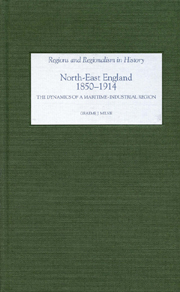Book contents
- Frontmatter
- Contents
- Dedication
- List of illustrations
- Preface
- 1 The North East in time and space
- 2 Horizons: ports, trade and mobility
- 3 Hinterlands and industrial districts
- 4 Making and managing the maritime landscape
- 5 Cohesion and diversity in the maritime urban system
- 6 The horizons of North East shipowning
- 7 Business and the maritime-industrial complex
- 8 Conclusion
- Sources and bibliography
- Index
1 - The North East in time and space
Published online by Cambridge University Press: 12 September 2012
- Frontmatter
- Contents
- Dedication
- List of illustrations
- Preface
- 1 The North East in time and space
- 2 Horizons: ports, trade and mobility
- 3 Hinterlands and industrial districts
- 4 Making and managing the maritime landscape
- 5 Cohesion and diversity in the maritime urban system
- 6 The horizons of North East shipowning
- 7 Business and the maritime-industrial complex
- 8 Conclusion
- Sources and bibliography
- Index
Summary
‘Geordie’ recalls a visit made to Newcastle and the Tyne by Lord Salisbury and Sir Stafford Northcote, and he tells you, with an expression of mingled mirth and contempt, that the great folks looked and wondered at what they saw, as if there had been ‘nee such things as the canny toon and the river and aal the warks alang'd’ until the distinguished persons came and invented the whole district by inspecting and admiring it.
These words were written by William Clark Russell, a Victorian mariner turned writer who knew something about living on edges, geographically as well as socially. Russell's Tyneside was just such a place on the margin, oriented toward shipping and maritime trade, sometimes seeming only vaguely connected to the land-based nation-state behind it, and the subject of much metropolitan ignorance and condescension. Being peripheral and being different are common themes in studies of the North East more generally, whether approached from a historical perspective or from those of the social sciences in assessing more contemporary policy issues. At the time of writing, the North East is widely regarded as the most clearly defined and self-aware of the English regions, thanks largely to its isolation from other clusters of population, and a cultural exceptionalism rooted in the rise and decline of heavy industry.
As a result, the North East was also, from the mid-1990s, top of the Labour Party's priority list for the creation of a devolved regional assembly.
- Type
- Chapter
- Information
- North East England, 1850–1914The Dynamics of a Maritime-Industrial Region, pp. 1 - 15Publisher: Boydell & BrewerPrint publication year: 2006



